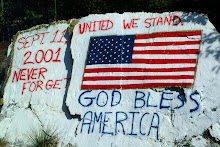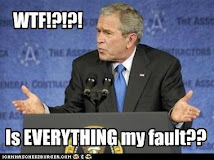Wednesday, May 5, 2010
Uncle Tom - A Profile in Conviction
Conservatives who happen to be people of color hear the words “Uncle Tom” on a regular basis. I have heard that term ever since I can remember. The term has always been to me a put down. During an interview of Alveda King, the niece of Martin, she said she viewed it as a compliment and viewed Uncle Tom as a hero.
I have no memory of reading Uncle Tom’s Cabin. I am sure that I read it in school, but I don’t remember the book at all. A few months back I picked up the book and started reading it on a very irregular basis. I went into reading this not believing that I would view Uncle Tom in this way. I was mostly wrong.
I found the book to be sad. Harriet Beecher Stowe wasn’t above racism herself. The narrative that she gave in the book makes that very clear. Although one must remember the time that this was written in. Racism was the acceptable view point. It was never questioned, not even by the northerners. While they felt that slavery should end, they certainly didn’t want to embrace the black community. Many whites wanted to round them up and send them all back to Africa. If you read deeply into the history books it seems that this was the view point that President Lincoln held as well. He was killed so shortly after the civil war ended that we will never know if this was his plan, but there is historical evidence to back up that view.
Black conservatives are called Uncle Tom’s all the time. They are also called Oreo’s, race traitors and many more derogatory names. Allen West recently said this during his tax day tea party speech. Many believe that he is turning his back on his race by embracing conservative views. I have never quite understood why it is that some believe that all blacks must walk in lockstep to a certain political ideology. How exactly is that equality if everyone must think alike?
I just finished the book today. I was totally blown away by the book, and realized I read the second half of the book much more quickly than I did the first half. I finished the book with a much greater understanding of what Ms. King was trying to say. The way that Tom lived his life is admirable.
Tom was a man who lived by his convictions. Tom was before anything else a Christian. He viewed his life through this prism. He loved his family and he lived his life in an honorable and decent way. At the beginning of the book Tom is sold to cover some debts of his original owner. His wife encourages him to run away with Eliza, another slave that was about to have her son sold away from her. Eliza couldn’t bear the thought of living without her son, so she ran. Tom told his wife that he couldn’t do that. His original master, Shelby, treated him fairly, as far as Tom was concerned. He felt that Shelby wouldn’t be doing this if it were not necessary. Tom read his bible and said his goodbye’s to his family. He left with the belief that he would be back to his family when the money was there.
Tom was sold to yet another “master” who treated him as well as one could expect during the time of slavery. Time went by and many things happen over the course of Tom living in Louisiana under his new circumstances. Tom was set to be freed by St. Clare but he died suddenly and that didn’t happen. Tom was eventually sold to one more Master. This one was a brutal and mean spirited man. Legree asks Tom to beat an older woman who is poor health; he is beaten when he refuses. Legree ends up killing Uncle Tom when he refuses to rat out his fellow slaves who have runaway. Sadly it was just before Shelby family raised enough money to bring him back to his family, where he would have been a free man with his family.
The point being that Tom never walked away from his own convictions. His belief system sustained him throughout his life. A life that was never easy and almost always sad. Tom was a man who used passive resistance to his existence. He certainly wasn’t one to be called a “sell out” or “race traitor”. There is nothing in the book that should make one jump to that conclusion.
When St Clare asks him if he would not be better off a slave than a free man, Tom responds with a straight: "No." "Why Tom, you couldn't possibly have earned, by your work, such clothes and such living as I have given you," says St Clare. "Know's all that Mas'r," says Tom. "But I'd rather have poor clothes, poor house, poor everything and have 'em mine, than have the best, and have 'em any man else's."
The narrative of the sell out actually began several decades after the books release. It started around the turn of the century. While slavery had ended decades earlier the institutionalized racism certainly had not ended. The traveling minstrel shows were very popular during the times of the First World War, and “Uncle Tom” type shows were the rage. This is where much of the narrative started.
While I may not necessarily call Uncle Tom a hero in the same way that Ms. King has referred to him as, what I will say if a politician is being called an Uncle Tom; they may just be someone worth voting for. Uncle Tom was man who lived by his convictions, loved his God, loved his family, and never wavered from what he believed in and what was important in his life. He did what was right, instead of what was easy. Wouldn’t it be nice if more of our politicians were like that?
Labels:
racial stereotypes,
racism,
uncle tom
Subscribe to:
Post Comments (Atom)





























4 comments:
Thank you for your thoughtful post. I have never read the book, but I might now. - Nancy
I've never read the book either. Your post may boost it's sales. Thanks.
You ladies really should read the book. While I was doing some research on the book I discovered that NAACP and other groups have worked hard at getting this book taken off school reading lists. So many people have probably not read it. The story is so totally different than what you think Uncle Tom means.
I do understand that the book has a racist stilt to it, but it was written before the civil war, so of course it did. Since people don't read it, they just believe the statements that Uncle Tom is a sellout. It simply isn't who the character is. He was just passive with his resistance.
It was a good book and I am glad that I read it.
The revisionist history of afro-centrism teaches that blacks were rising up, running away, and resisting everywhere.
The sad fact of history, which is not at all disparaging to blacks, is that the vast majority of them accepted their condition from birth to death over hundreds of years. Most of them didn't understand a condition other than slavery.
But that reality doesn't jibe with the spirit of heroism, resistance, and fighting oppression with which we endow history's great revolutionaries. They celebrate Nat Turner and the Underground Railroad, but there was no equivalent of Spartacus.
The reaction to Uncle Tom arises from the SHAME that there were not more Nat Turners. They want to believe they weren't...slaves.
Blacks have no reason to feel ashamed. Put chains on me and whip my back enough times and I'll pick your damned cotton too! When my kids and grandkids and great-grandkids are born only to know the lash and the labor, they won't be writing any Declarations of Independence. Revolutions are almost always led by the wealthy and the educated.
We celebrate wondrous stories of people who broke their bondage, but many people for THOUSANDS of years suffered under the yoke of oppression. Many still do.
There have been and will be millions of black heroes. They have an opportunity for heroism every day by rejecting dependency on government and the crime and poverty around them to make their lives better than the one they were born into.
Uncle Tom wasn't a failure. He was a survivor and you need to live to fight another day. There would have been no Nat Turner, no Frederick Douglass, no Rosa Parks, no Martin Luther King, and no Michelle Obama if there had not been MILLIONS of Uncle Toms whose only goal for their entire lives was to survive.
Revolutions don't always turn out well. Revolutions need funding, arms, leadership, organization and resolve of which black slaves had little. They couldn't have had it.
Afro-centrism, like liberalism, is founded in LIES and SELF-HATRED.
Post a Comment